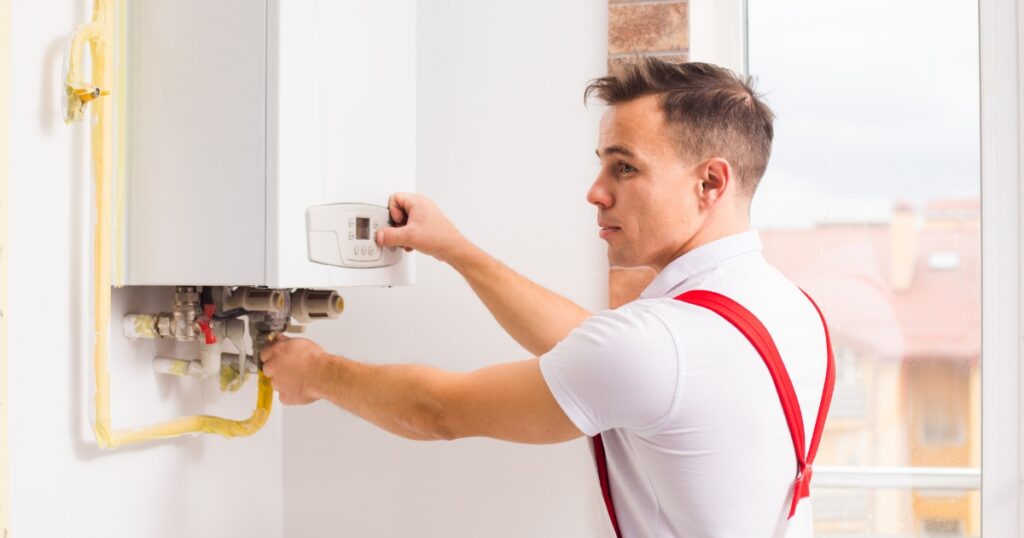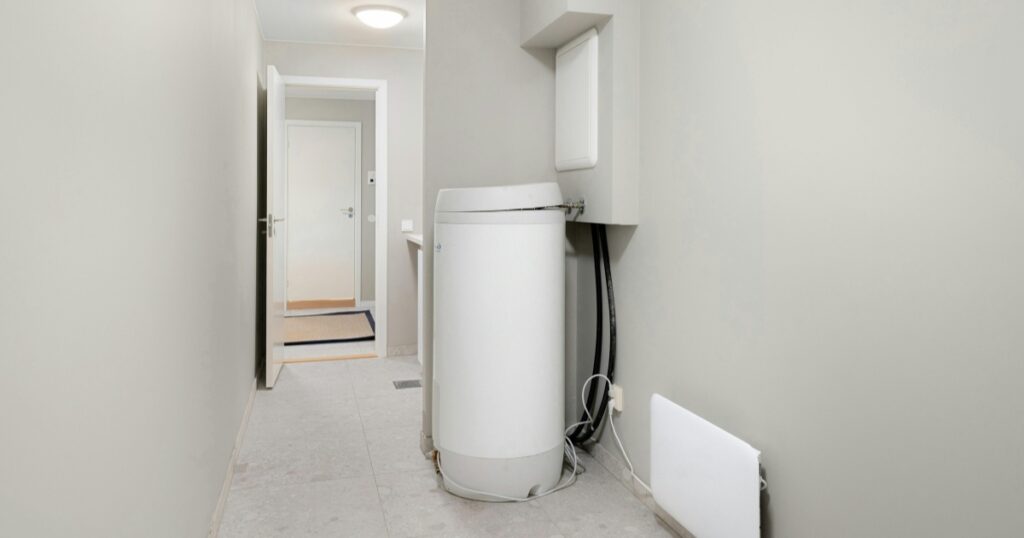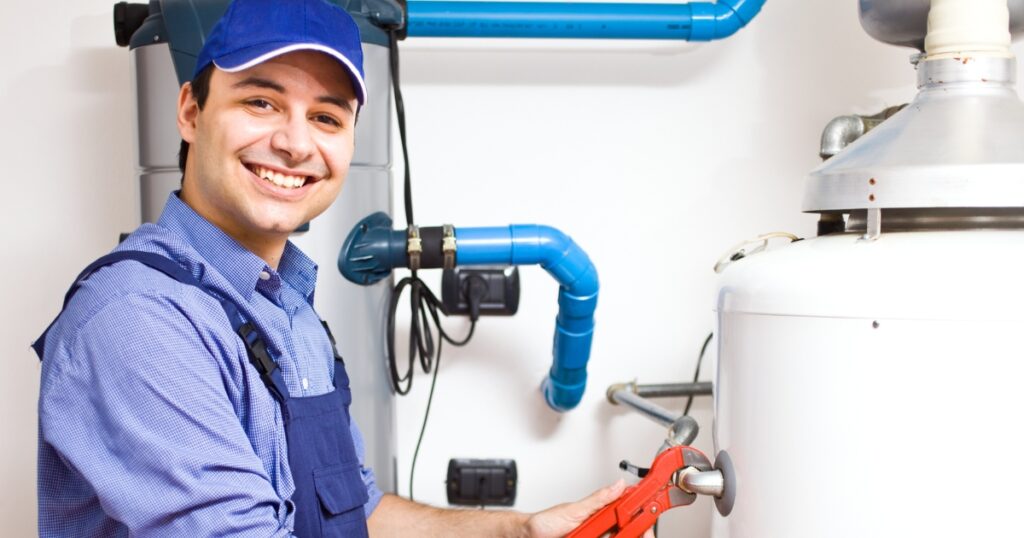Are you fed up with battling those annoying calcium deposits in your hot water system? Yeah, mate, we know the feeling all too well – it’s a proper hassle. Our digging around found that hard water is the main villain behind these stubborn mineral nightmares.
Key Takeaways
- Hard water is a major player in creating those tough calcium buildups we see in our hot water systems. It’s packed with minerals like calcium and magnesium, which can gunk up pipes and reduce their efficiency over time.
- Installing a whole-home water softener can really take the edge off hard water by removing those pesky minerals before they get a chance to cause trouble. This not only keeps your pipes cleaner but also boosts the lifespan of your appliances.
- Aging pipes don’t do us any favours either; they’re more likely to catch and hold onto mineral deposits from hard water, leading to blockages and all sorts of plumbing headaches.
- Flushing out your hot water tank every now and then helps kick out sediment buildup at the bottom that could be cramping your system’s style. Think of it as giving your tank a good clean-out so it can do its job right.
- When calcium deposits have already made themselves at home in your system, rolling up the sleeves with some descaling agents or vinegar could help dissolve these unwelcome guests and get things running smoothly again.

What Causes Calcium Deposits in Pipes?
Hard water and aging pipes contribute to calcium deposits in pipes. These factors lead to the accumulation of mineral deposits, which can result in reduced water flow and potential clogging issues.
Hard water
Hard water plays a major role in the formation of calcium deposits in our hot water systems. It contains high levels of minerals such as calcium and magnesium, which can lead to scale buildup and sediment accumulation over time.
As these mineral deposits build up, they can narrow the pipes and reduce the efficiency of our hot water service systems.
To deal with these challenges, using a whole-home water softener significantly reduces limescale buildup by removing these hardness minerals from our water supply. This preventive measure not only helps in managing lime deposits but also enhances the overall performance and lifespan of our plumbing maintenance.
Aging pipes
As pipes age, they are more prone to mineral buildup from hard water, leading to potential blockages and reduced flow. Over time, the deposition of calcium and magnesium can restrict the diameter of the pipes, affecting the overall efficiency of your hot water system.
This may result in decreased water pressure and an increased workload on your appliances. Regular maintenance is essential to address this issue and ensure that your aging pipes do not contribute to a decline in the effectiveness of your hot water service.
Older pipes also tend to develop corrosion which can exacerbate limescale buildup, further impacting the performance of your hot water system. It’s important for homeowners to be aware of these factors and take proactive measures to prevent or address aging pipe issues through regular cleaning, flushing maintenance, or professional assistance if necessary.
The Impact of Calcium Deposits on Hot Water Systems
Calcium deposits in hot water systems reduce efficiency and lead to clogged pipes, shortening the lifespan of appliances. Additionally, cleaning becomes inefficient due to the impact of calcium deposits on hot water systems.
Reduced efficiency
Hard water, containing high levels of minerals like calcium and magnesium, can lead to decreased efficiency in hot water systems. The buildup of limescale on heating elements and pipes reduces the transfer of heat, making the system work harder to achieve the desired temperature.

As a result, more energy is consumed to maintain the hot water supply. Regular maintenance and descaling are essential to address this issue and improve the overall efficiency of the hot water service system.
Installing a water softening system can effectively prevent limescale formation and improve hot water efficiency by removing hard minerals from the water supply. This proactive approach not only saves money on energy bills but also extends the lifespan of appliances by reducing strain caused by mineral buildup.
Clogged pipes
Mineral deposits, like calcium and magnesium, from hard water can accumulate in the pipes over time. This buildup can lead to reduced water flow, lower pressure, and potential blockages in your plumbing system.
Addressing clogged pipes caused by calcium deposits is crucial to maintaining a consistent and efficient hot water supply.
Regular maintenance and treatment of hard water are essential steps to prevent or remove mineral buildup in your pipes. By investing in prevention methods such as installing a whole-home water softener or using descaling agents when necessary, you can effectively manage the issue of clogged pipes due to calcium deposits.
The shortened lifespan of appliances
Calcium deposits in hot water systems can lead to a shortened lifespan of appliances. The buildup of mineral deposits, particularly calcium and magnesium, can cause damage to various components within the system over time.
This can result in increased wear and tear on water heaters, leading to reduced efficiency and potentially costly repairs or premature replacement. As off-white solids deposit inside pipes and heat exchangers, the diameter is gradually reduced, impacting the flow of water and causing strain on appliances.
Regular maintenance and addressing calcium deposits promptly are crucial in preventing a shortened lifespan for your hot water system’s appliances. By investing in prevention methods such as installing a water softening system or using descaling agents when needed, you can protect your appliances from the damaging effects of calcium deposits.
Inefficient cleaning
Regular cleaning is essential to prevent inefficient cleaning of hot water systems. Cleaning the system regularly removes calcium deposits and sediment, which can affect the efficiency of the water heater.
Neglecting regular cleaning may lead to reduced hot water supply and increased energy consumption due to a build-up of scale in the pipes and heat exchangers. Additionally, efficient cleaning ensures that limescale buildup doesn’t impact the performance and longevity of your hot water system.
Investing in preventive maintenance like descaling agents or vinegar treatments can help address inefficient cleaning caused by calcium deposits. Regularly flushing the hot water tank will also contribute to maintaining an efficient operating system, ensuring consistent and reliable access to hot water.
Prevention and Treatment of Calcium Deposits
To prevent and treat calcium deposits in hot water systems, consider installing a water softening system or flushing the hot water tank regularly. Using descaling agents or vinegar can also help manage lime deposits.
Seeking professional help when needed is crucial for maintaining an efficient hot water system. For more detailed tips on effectively managing calcium deposits, read further into the article.
Installing a water-softening system
To manage calcium deposits in your hot water system, consider installing a water-softening system. This solution effectively removes minerals like calcium and magnesium from the water, preventing limescale buildup in the pipes and inside the hot water tank.
By investing in a whole-home water softener, you can significantly reduce the impact of hard water on your plumbing system, leading to improved efficiency and a longer lifespan for your hot water appliances.
Additionally, this method helps ensure that you have access to clean and softened water throughout your home, addressing the challenges associated with calcium deposits in Perth’s hot water systems.
Flushing the hot water tank
Flushing the hot water tank removes sediment and mineral buildup, which can compromise its efficiency. Over time, minerals accumulate at the bottom of the tank, creating a layer of sediment that reduces heating capacity and promotes corrosion.
By draining and flushing the tank regularly, you can prevent these issues and maintain optimal performance. This process involves turning off the power supply to the heater, connecting a hose to the drain valve at the base of the tank, and then opening both hot water taps within your home to allow air into the system as it drains.
Once drained, close all valves and begin refilling the tank before restoring power.
Ensuring that your hot water system is free from sediment buildup by regularly flushing your hot water tank is integral for maintaining an efficient and long-lasting unit. Regular maintenance will also help in avoiding potential dangers related to sediment accumulation such as reduced heating capacity or possible damage to appliances connected with pipes from calcium deposits.
Using descaling agents or vinegar
To tackle calcium deposits in your hot water system, consider using descaling agents or vinegar. These substances can help dissolve the mineral buildup and restore efficiency to your appliances.
When choosing a descaling agent, ensure it is safe for use in your specific hot water system. Similarly, when using vinegar, dilute it with water before applying it to the affected areas.
It’s essential to follow the manufacturer’s instructions carefully to avoid damaging any components of your hot water service systems.
Hot Water Service Regular maintenance
Regular maintenance of your hot water system is crucial to prevent and remove calcium deposits. By scheduling regular check-ups, you can ensure that any sediment buildup in the tank is addressed promptly, preventing potential issues down the line.
This proactive approach also extends the lifespan of your water heating system by maintaining its efficiency and keeping it in optimal working condition. Additionally, incorporating routine cleaning into your maintenance plan helps to eliminate limescale buildup and maintain a consistent hot water supply.
When calcium deposits are left untreated, they can lead to reduced efficiency and clogged pipes within your hot water service systems. Regularly flushing the hot water tank and using descaling agents or vinegar as part of your maintenance routine effectively removes these mineral deposits, ensuring that your appliances continue to function efficiently without any disruptions caused by scale buildup.
Common Issues Caused by Hard Water
Hard water causes limescale formation and reduces the efficiency of water heaters. It also leads to clogged pipes and fixtures, affecting the overall performance of hot water systems.
Limescale formation
Limescale formation occurs when hard water containing minerals like calcium and magnesium is heated. The heat causes these minerals to solidify and form a crusty, off-white deposit on the inside surfaces of pipes and heating elements.

Over time, this limescale buildup reduces the diameter of pipes, leading to reduced water flow and increased pressure on the hot water system. This can result in decreased efficiency of water heaters, clogged pipes, and potential damage to appliances.
Managing limescale formation is crucial for maintaining an efficient hot water system.
To address limescale formation in your hot water service system, consider using descaling agents or vinegar regularly to remove scale from the heater element. Additionally, investing in a whole-home water softener can help prevent mineral deposits by removing hard minerals from the water supply.
Reduced efficiency of water heaters
Limescale formation leads to reduced efficiency of water heaters. As calcium deposits accumulate in the pipes and hot water tank, they act as insulators that reduce the transfer of heat.
This results in longer heating times and increased energy consumption for maintaining desired water temperatures. Over time, this can lead to higher utility bills due to the inefficiency caused by limescale buildup.
Addressing limescale accumulation is crucial for maintaining the optimal performance of your hot water system. Regular maintenance and using descaling agents or vinegar can help remove existing deposits, improving the efficiency of your water heater and saving on energy costs.
Clogged pipes and fixtures
Dealing with limescale buildup not only impacts the efficiency of water heaters but also leads to clogged pipes and fixtures. As calcium deposits accumulate in the plumbing system, they can restrict the flow of water through pipes and cause blockages in fixtures such as taps and showerheads.
This reduction in water flow can affect your daily activities and may lead to costly repairs if left unaddressed.
Calcium deposits can gradually build up inside pipes, resulting in decreased water pressure throughout your home. In severe cases, clogs may form, leading to slow drainage or even complete blockages.
Investing in prevention methods
To prevent calcium deposits in hot water systems, consider installing a water softening system to reduce the minerals causing limescale buildup. Regularly flushing the hot water tank and using descaling agents or vinegar can help remove existing deposits and prevent further accumulation.
Seeking professional maintenance for your hot water system is crucial in detecting and addressing potential issues early on. By investing in prevention methods, such as these, you can maintain the efficiency of your water heating system and prolong its lifespan.
Implementing preventive measures like using descaling agents or vinegar helps address existing calcium deposits while safeguarding against future buildup. Regular maintenance plays a key role in ensuring that potential issues are detected early and resolved promptly, contributing to improved overall efficiency of your hot water service systems.
Seeking professional help when needed
Investing in prevention methods can significantly reduce the risk of calcium deposits in your hot water service systems. However, if you notice persistent issues or suspect significant buildup, seeking professional help is crucial to accurately diagnose and address the problem.
Professionals can conduct thorough inspections, assess any damage caused by limescale buildup, and recommend suitable solutions tailored to your specific situation. With their expertise, they can provide effective treatments and maintenance strategies to keep your hot water system running at its best.
Regular maintenance is key to avoiding calcium deposits.
Regular maintenance of your hot water system is essential to prevent calcium deposits from forming in the first place. By conducting routine checks and regular cleaning, you can keep your system running smoothly and efficiently.
This includes flushing the hot water tank, inspecting for any signs of sediment buildup, and ensuring that all components are working properly. Additionally, scheduling professional maintenance at least once a year can help identify and address any potential issues early on, maintaining the overall health of your hot water service system.
Ensuring consistent maintenance not only helps prevent calcium deposits but also contributes to prolonging the lifespan of your appliances by promoting their optimal performance.
Your Comfort, Our Swift Hot Water Restoration!
Taking proactive steps to prevent and treat calcium deposits in hot water service systems ensures efficient performance and a prolonged appliance lifespan. For more tips on managing limescale and improving your hot water system’s efficiency, keep reading our detailed guide.
Is your hot water service plagued by stubborn calcium deposits? Don’t let limescale buildup ruin your system’s efficiency. Hot Water Repairs Today is here to help!
Our experienced team specialises in tackling calcium deposits and restoring your hot water service to optimal performance. Say goodbye to reduced water flow and increased energy bills caused by limescale buildup.
Don’t wait until the problem worsens. Contact us today to schedule a thorough inspection and get your hot water flowing freely again.






